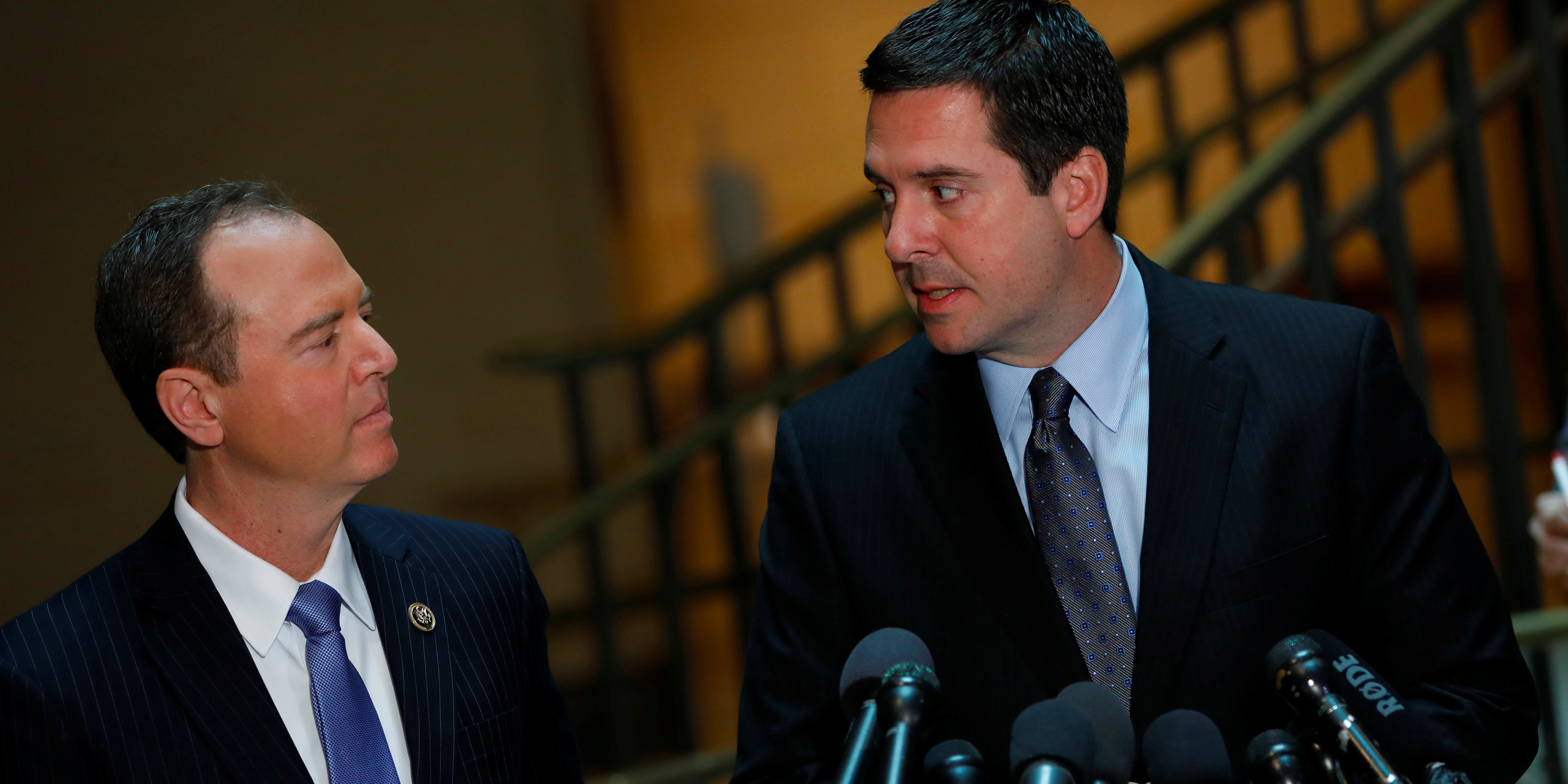- The House Intelligence Committee voted unanimously to approve the release of a memo authored by ranking member Adam Schiff which disputes the key points in a rival memo by chairman Devin Nunes that was released last week.
- The Democratic rebuttal is a “point by point refutation” of the Nunes memo that would “lay waste” to all of its central claims, a Democratic committee source said.
- The Republican memo has been at the center of President Donald Trump’s and his allies’ efforts to discredit the ongoing Russia investigation.
The House Intelligence Committee on Monday voted unanimously to approve the release of a memo authored by ranking member Adam Schiff, which centers around the FBI and Department of Justice’s application for a warrant to surveil Carter Page, a former adviser to President Donald Trump’s campaign.
Schiff drafted his memo as a rebuttal to the Republican memo released by the committee last week, which purports to show that the FBI and Department of Justice (DOJ) abused their surveillance authority when they applied for the Page warrant.
In particular, the Republican document, which was authored by House Intelligence chairman Devin Nunes and his staff, said the DOJ relied primarily on what it characterized as insufficient and unreliable information contained in the Steele dossier when submitting the application for the Foreign Intelligence Surveillance Act (FISA) warrant for Page. The Steele dossier is an explosive collection of memos alleging collusion between the Trump campaign and Russia that was compiled by former British intelligence officer Christopher Steele.
The Nunes memo claims the FBI and DOJ omitted “material and relevant” information about the dossier’s funding and origins from the FISA application. It also says former FBI Deputy Director Andrew McCabe said in his congressional testimony last year that the Page warrant would not have been sought without information in the dossier.
The Democratic memo focuses mainly on pushing back against the Nunes memo's characterization of McCabe's testimony and its claim that the dossier was the sole basis for the Page FISA application, two sources on the House Intelligence Committee told Business Insider.
It will also dispute Republican claims that the DOJ and FBI concealed critical information about the dossier's funding from the Foreign Intelligence Surveillance Court (FISC) when submitting the Page FISA application. Nunes conceded as much in an interview with "Fox & Friends," telling the hosts that the FBI included the dossier's political funding in a footnote when applying for the Page warrant.
Its production was originally financed by a group of Republicans who opposed Trump during the Republican primaries. After Trump became the party's nominee, Hillary Clinton's campaign and the Democratic National Committee hired the Perkins Coie law firm, which in turn retained the opposition-research firm Fusion GPS to fund the dossier's production.
The Democratic rebuttal will also shed light on the FBI's "pre-existing focus" on Page that was underway long before the DOJ applied for the warrant, one of the sources said.
The claim bolsters reports last week that Page had been on counterintelligence officials' radar since 2013 - more than three years before he joined the campaign.
In January 2013, according to Page's testimony before the House Intelligence Committee last year, he met Russian businessman Victor Podobnyy, a close ally of Russian President Vladimir Putin, at an event in New York. He met with Podobnyy a second time two months later, in March 2013.
That June, Page was interviewed by two FBI counterintelligence agents who were investigating whether Podobnyy and two others were Russian spies, according to court documents. When they started questioning him, Page reportedly told the agents their time would be better spent investigating the Boston Marathon bombing, which had occurred in April 2013. The FBI obtained its first FISA warrant to monitor Page that same year.
The Republican memo has been central to Trump's and his allies' claims that the Russia investigation, as well as the nation's top law enforcement agencies, are infected with anti-Trump bias and corruption.
While Republicans said the memo promoted transparency and held the government responsible, however, Democrats and intelligence officials said it contained a host of inaccuracies that painted an incomplete and misleading picture of the intelligence community, as well as the origins of the Page FISA warrant and the Russia probe.
The Democratic memo "is a factoral, point-by-point refutation of the Nunes memo" and "would lay waste to the idea that the investigation and FISA application for Page was based solely or even mainly on the Steele dossier, and also to the idea that the FISA court was not informed that the Steele dossier had been paid for with political motivations" said a Democratic committee source.
The memo will now go to Trump, who will have five days to review the document and either support its declassification or object to it.

